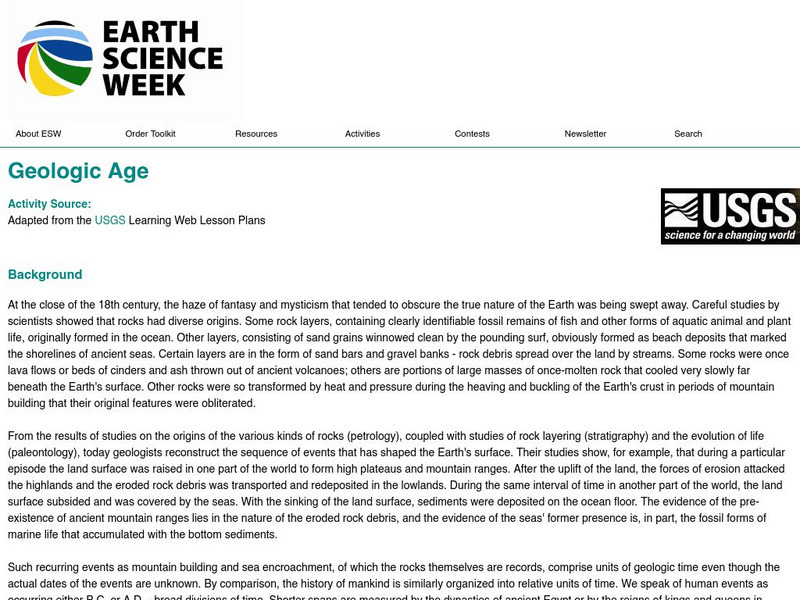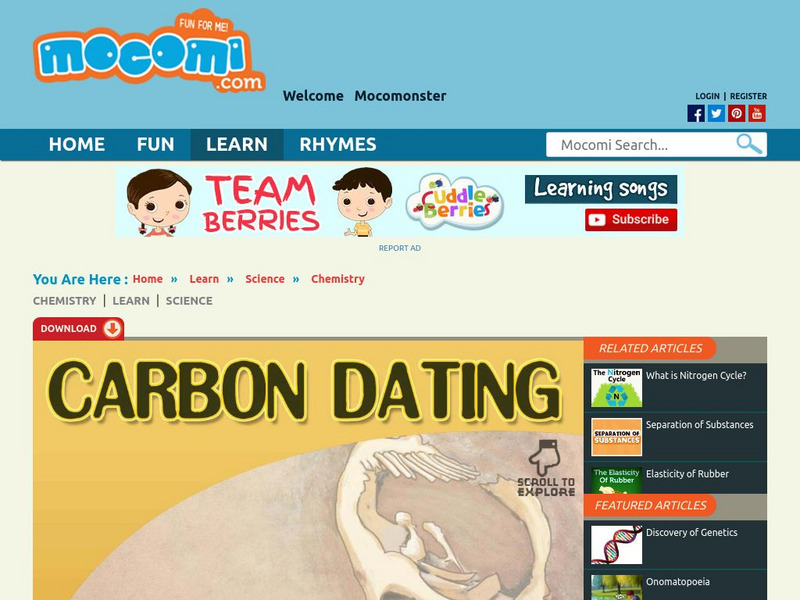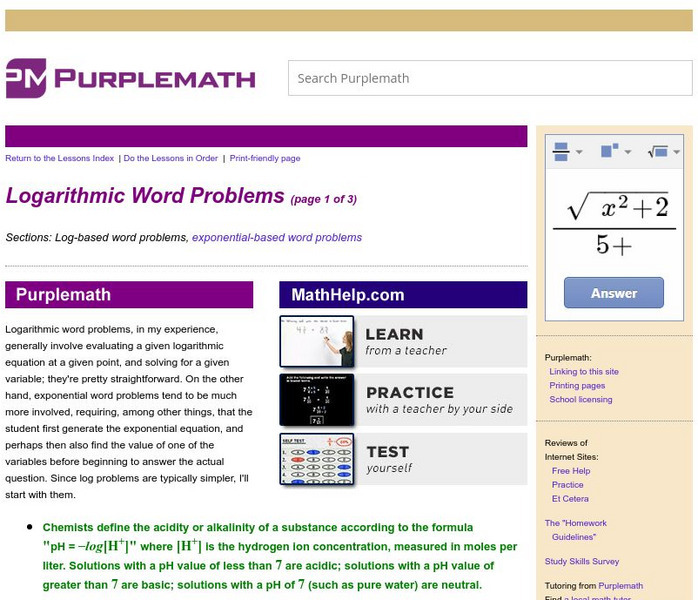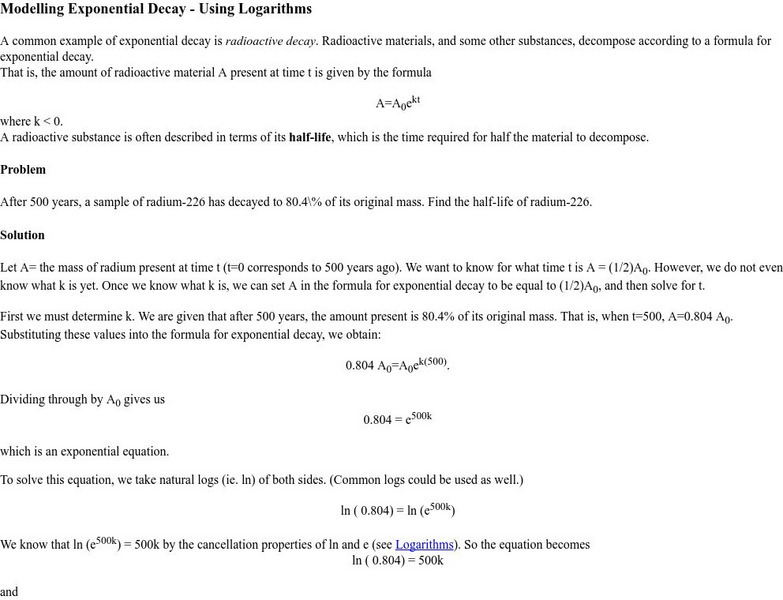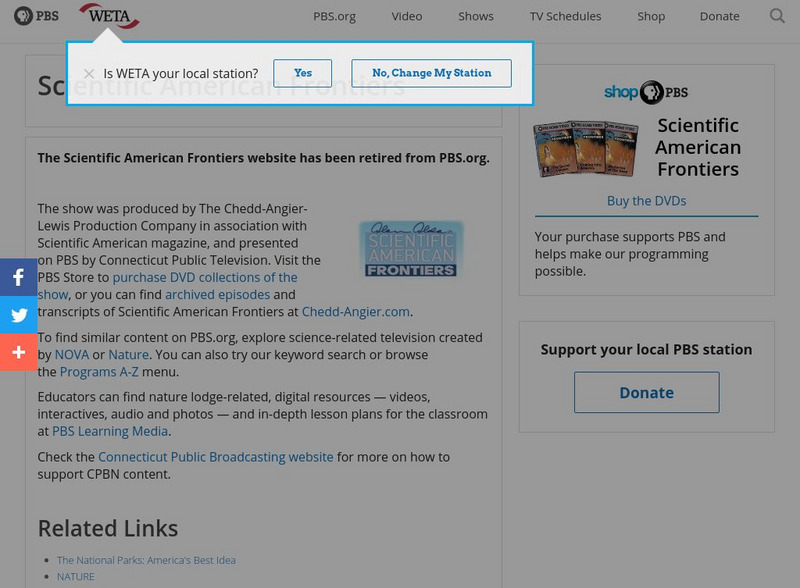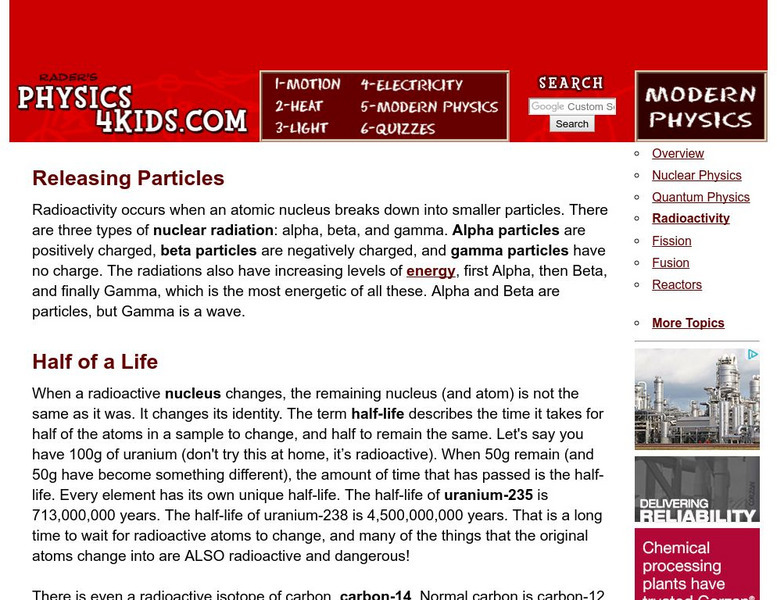American Geosciences Institute
American Geosciences Institute: Earth Science Week: Geologic Age
Explore geologic time of the Earth and learn how radioactive decay helps to establish a timeline.
Mocomi & Anibrain Digital Technologies
Mocomi: Carbon Dating
How do we know how old a fossil is? We use carbon, as every living being has carbon. Carbon dating, also known as radiocarbon dating, is a method of estimating the age of carbon-bearing materials up to 60,000 years old. Scroll through to...
CK-12 Foundation
Ck 12: Physical Science: Radioactive Half Life
[Free Registration/Login may be required to access all resource tools.] The half-life of a radioisotope, rates of radioactive decay and variation in half-lives in different radioisotopes.
CK-12 Foundation
Ck 12: Physical Science: Half Life and Radioactive Dating
[Free Registration/Login may be required to access all resource tools.] Explains radioactive dating, how it works, and how carbon-14 is used to date the remains of living things.
American Geosciences Institute
American Geosciences Institute: Earth Science Week: Dating Popcorn
In this activity, students use popcorn to simulate the process scientists use to date layers in an ice core.
Science Struck
Science Struck: How Does Radioactive Decay Work?
Explains the processes of radioactive decay in primary and secondary modes.
Science Struck
Science Struck: List of Radioactive Elements
Learn about radioactivity, the different types of radioactive decay, isotopes, and half-life of a radioactive element. Includes a long chart listing radioactive elements, atomic number and mass number, decay type, and length of half-life.
BBC
Bbc: Gcse Bitesize: Radioactive Emissions
This lesson focuses on radioactive emissions including radioactive decay, half-life, using half-life, how to calculate net decline, a table showing how the count rate of an isotope might change over time, and a link to a test.
Purple Math
Purplemath: Logarithmic Word Problems
Logarithmic word problems generally involve evaluating a given logarithmic equation at a given point, and solving for a given variable; they're pretty straightforward. This resource contains worked examples to demonstrate the reasoning...
CK-12 Foundation
Ck 12: Physics Simulation: Radiocarbon Dating
[Free Registration/Login Required] Learn about how radiocarbon dating works and how anthropologists can use this method to figure out who long ago people lived. A PDF worksheet and a video tutorial are also available. [5:41]
CK-12 Foundation
Ck 12: Physics Simulation: Marie Curie's Classroom
[Free Registration/Login Required] Study the basics of radioactive decay and the properties of atomic nuclei in Marie Curie's laboratory and classroom. A PDF worksheet and a video tutorial are also available. [3:32]
Alabama Learning Exchange
Alex: Radiation / Half Life
The students will evaluate their personal radiation dose. They will develop an understanding of the term radiation and how it relates to everyday life. The will simulate how radioactive material decays and apply the term half-life....
Utah Education Network
Uen: Isotopic Dating Activity
Learners will do research relating half-life and the age of radioactive substances on interesting topics.
Utah Education Network
Uen: Radioactive Review
This lesson consists of half-life problems for the young scholars to work out.
Lawrence Berkeley National Laboratory
Berkeley Lab: Radioactivity
Overview of radioactivity, the process in which particles are emitted from nuclei as a result of nuclear instability.
University of Saskatchewan (Canada)
University of Saskatchewan: Modeling Exponential Decay Using Logarithms
Radioactive decay is a real-life example of exponential decay. This site solves an example problem by using the exponential decay equation.
PBS
Pbs Teachers:nordic Sagas: Radioactive Reindeer
Demonstrate how soil absorbs radioactivity by simulating the absorption of the radioactive isotope from the Chernobyl disaster into the lichen of Scandinavia. Use a chart to figure out the half-life of the isotope.
Physics4kids
Physics4 Kids: Modern Physics: Releasing Particles
Explains basic information about radioactivity. Learn about half-life through text and video.
Ducksters
Ducksters: Chemistry for Kids: Radioactivity and Radiation
Kids learn about the science of radioactivity and radiation in chemistry including radioactive decay, types, measurements, half-life, and the dangers.
Ducksters
Ducksters: Chemistry for Kids: Isotopes
Study the science of isotopes in chemistry including naming isotopes, hydrogen, examples, fun facts, unstable, and stable on this site.
Department of Defense
Do Dea: Ap Calculus: Radioactivity and Half Life [Pdf]
Apply the Law of Exponential Change to solve a "real-world" science problem. Formulas and examples are provided. Great review for the AP Calculus test!


